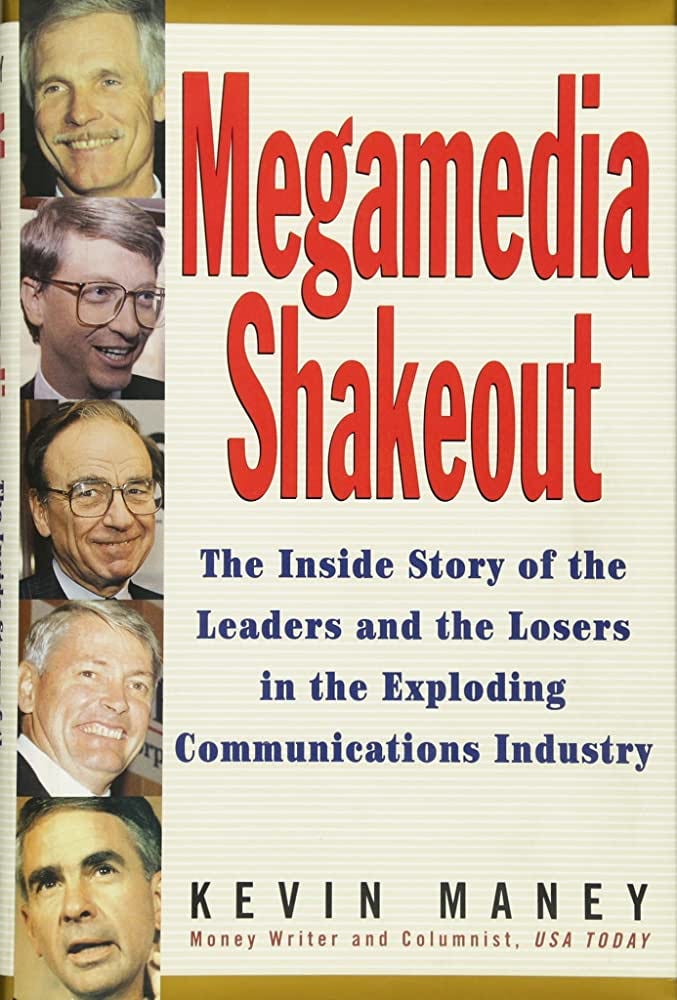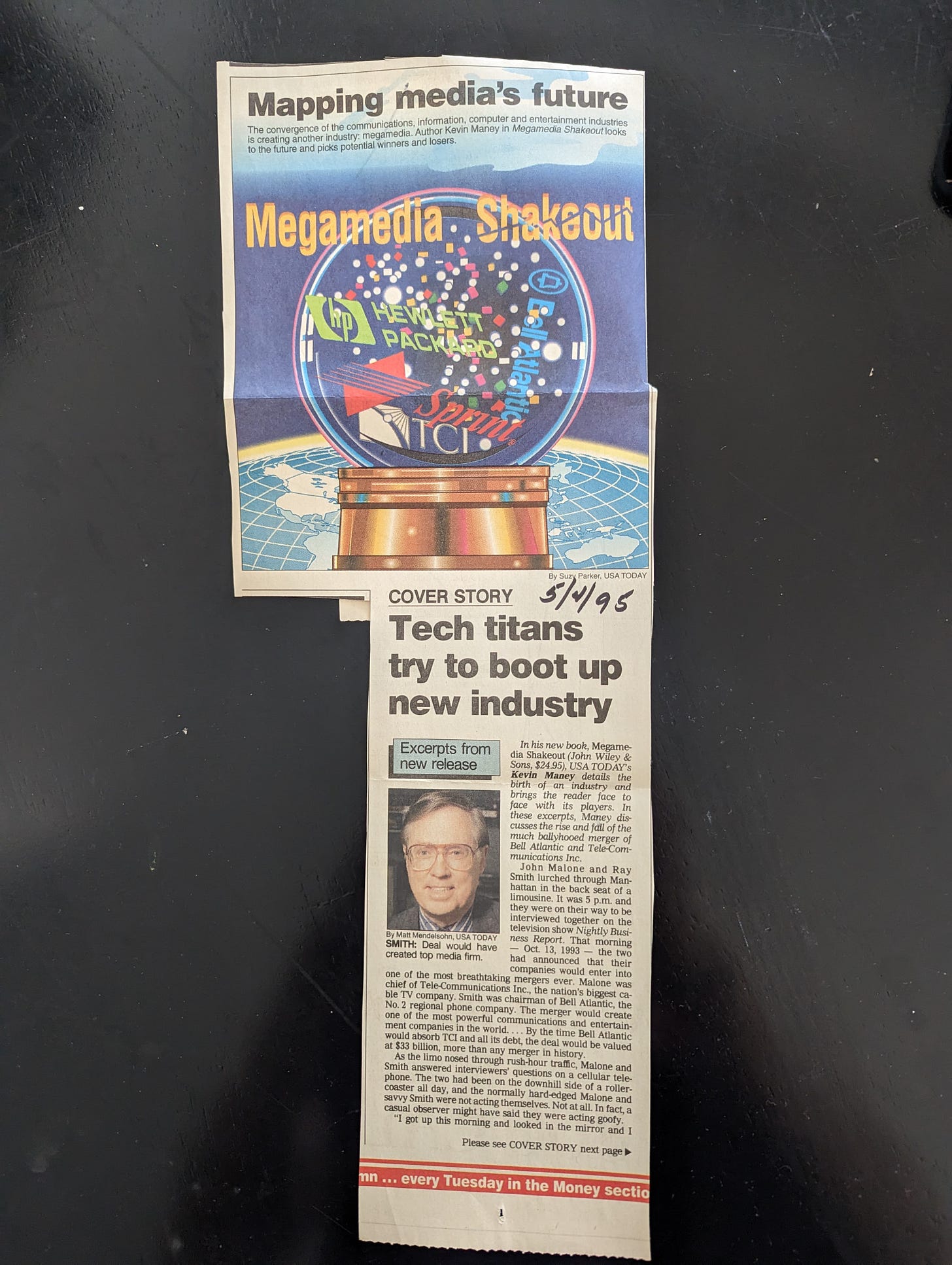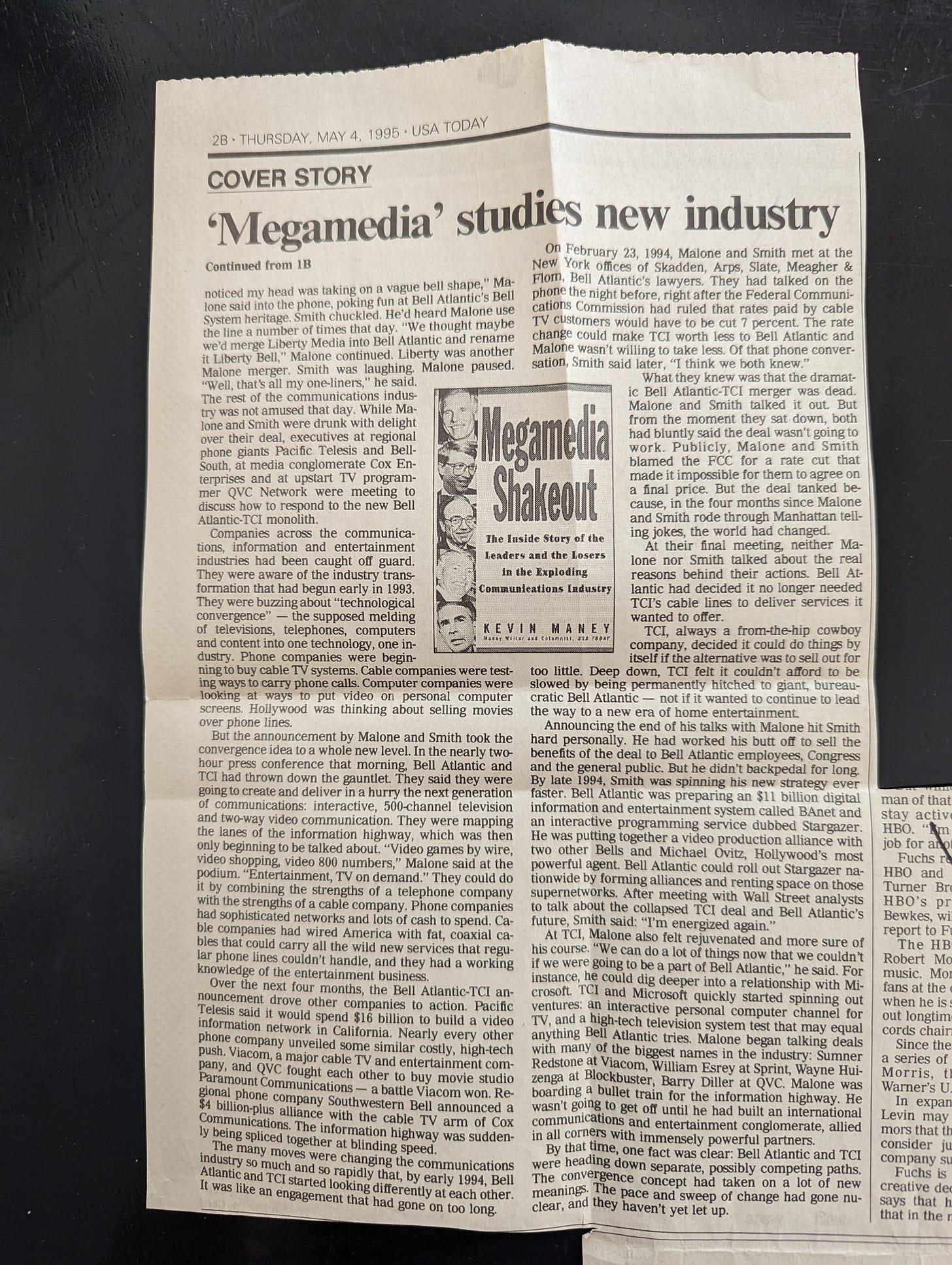What 1995 Can Tell Us About 2023
Then it was Netscape Navigator; now it's ChatGPT
The wonder and panic stirred up by ChatGPT and other generative AI feels a lot like 1995, which leads to some thoughts about how the next few years might go.
I ended up in the middle of the frenzy when the world first understood that the consumer internet was coming fast. My first book came out in April 1995. It was titled Megamedia Shakeout, and I’m pretty sure it was the first book describing how all media was going to become digital.
In the book, I took a shot at what that radical shift would mean to various industries like telecom, computers, TV and news. (Looking back, I got the big picture mostly right, but was often wildly wrong about the fate of particular companies. Sooo…I’m not actually recommending you go pick up the book.)
I got lucky. Just as the book hit stores, Netscape exploded as the darling of the new World Wide Web. Early adopters started to buy books on Amazon.com, find news from far away cities through Yahoo, and put crap from their basements for sale on just-minted eBay. Every kind of company and profession saw this and suddenly got nervous – and was desperate for anything that might give them some insight about what was likely to happen.
My book nailed the timing, not particularly by design but because I had started writing about the “information superhighway” and “interactive TV” in the early 1990s for USA Today. I was fascinated by pioneers who were talking about a new era of electronic, two-way communication – people like John Malone, then just a cable TV mogul; John Sculley, Apple’s CEO; and Al Gore, the U.S. vice president. Netscape wasn’t even around yet – it was founded in 1994.
I thought there might be a book in there somewhere, and so I wrote up a book proposal. I had not yet published a book and was naïve about the publishing industry. I tried finding an agent or interested publisher but got nowhere. Eventually, I slid the printout of the proposal into a drawer and gave up.
But I kept writing stories about the topic. A few months later, I got a phone call out of the blue from John Mahaney, then a book editor at John Wiley. He said he saw some of my stories and wondered if I’d consider expanding them into a book. Flabbergasted and excited, I said, with as much cool as I could muster, that yes, I have a proposal that I could put in the mail…uh…tomorrow!
I think I sold the book to Wiley for a $30,000 advance. Then I had to figure out how to write a book.
The biggest challenge ended up being one I didn’t foresee: I was writing a book at the same time as what I was writing about was changing every day. I started out writing about the pre-Web ideas peddled by Malone, Gore and others, but had to catch up as the internet we now know started to unfold. The publishing industry moves at its own crawl, so the book wasn’t published until six months after I’d stopped writing. By then, some of the book was already outdated.
Didn’t matter. In a flash, I was perceived as some kind of digital media guru – a Yoda of the internet. There were many others who were knowledgeable about the unfolding events – but they didn’t have books out yet. Requests to be on TV and radio poured in. And then came the requests to do speeches and presentations. I was not prepared for any of this. I wish I knew then what I know now about how to be effective in front of an audience. Looking back, I think I was mostly terrible.
And yet…
I saved a memo that I wrote to my publisher’s PR person, dated May 31, 1995 – not even two months after the book came out. It detailed requests that had come in. A senior VP at Goldman Sachs had me come in to address its tech and communications unit. The chairman of Frontier Corp., then a medium-size telecom company, asked me to talk at its next board meeting. Bell Canada requested I talk at its next executive off-site. The Montreal Film Festival booked me for a speech. The National Association of Federal Credit Unions asked me to speak at its annual convention.
Much like ChatGPT today, Netscape was that era’s chief catalyst. The company’s web browser – the first on the market – ignited a billion epiphanies. The internet overnight went from distant vision to here today. And there was a widely-shared gut feeling that this was going to change everything – though most people couldn’t yet comprehend how.
But…while the internet did change everything, it took longer and wound up being different than anyone imagined in 1995. Many of the early ideas about the internet were either naïve and too limited (Yahoo’s hand-crafted listings gave way to search, for instance) or too ambitious and too early (buying groceries or watching video online failed spectacularly until technology caught up and made it work). The early dot-coms became an investment craze for five years until it became obvious most of what was being peddled was too much too soon. The bubble burst in 2000, killing off vast swaths of internet companies.
And then, out of that destruction, a new generation of innovators in the mid-2000s created the internet and cloud that truly changed life and work. We got Google, founded at the end of the dot-com bubble, rising in early 2000s. Same with Netflix. LinkedIn was founded in 2002; Facebook in 2004; Twitter in 2006; Uber in 2009. Apple’s iPhone, which made the internet mobile, debuted in 2007.
Today, I look at generative AI through that historical lens and see similarities. ChatGPT, like Netscape’s Navigator, has blown the doors open for generative AI. We now know it’s real. It will change everything. It’s exciting. It’s frightening. Innovators are rushing to get on the bandwagon. They’ll try a lot of new things that will be wrong. They’ll try some things that will be wrong now but right later. We’ll imagine grand universe-altering outcomes and think they’ll happen tomorrow but won’t for ten years. Yet we’ll get blindsided by applications hardly anyone saw coming that take off sooner than anyone could’ve expected.
In the long run, whatever you think is going to unfold because of generative AI, most of it will turn out to be wrong.
However much you can imagine it will change the world in ten years, most of it will turn out to be short-sighted and far less rich than what really happens.
My bet is that we see a boom and bubble, followed by a crash that brings us back to reality, followed by a flourishing of innovations that completely alter our way of life. Everything happens faster in 2023 than it did in 1995, so most likely we’ll run through a fast-forward version of the boom-bust-boom cycle. (One site that’s tracking generative AI startups lists 250 as of this writing, and ChatGPT isn’t even six months old.)
Looking back on my Megamedia Shakeout experience, I’m glad I’m not writing a book about generative AI now and trying to keep up. However, I did write two books about AI. The first, The Two-Second Advantage, came out in 2011, and looked at the efforts to build brain-like AI. That one was apparently so early, the business world wasn’t yet worried. I certainly didn’t get speaking requests from boards and film festivals.
The second, co-authored with Hemant Taneja, was Unscaled: How AI and a New Generation of Upstarts Are Creating the Economy of the Future. It landed in 2018, and dug into how AI will change things broadly, and how it will impact specific industries such as banking, retail, healthcare and energy. It also was apparently a bit too early, and my guess is that a couple decades from now, I’ll look back on it and see that we got the big picture right and many of the specifics about companies and industries wrong.
So I think I just came full-circle back to what I did in 1995.
Odd footnote: the editor who bought Megamedia Shakeout, John Mahaney, later moved to the publisher Public Affairs, and bought Unscaled. I guess John is caught in the same universe loop as I am.
This was an excerpt from the book as it appeared in USA Today on May 4, 1995.




